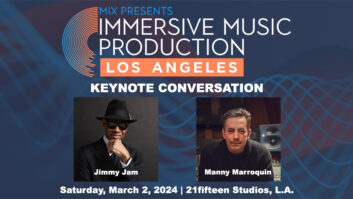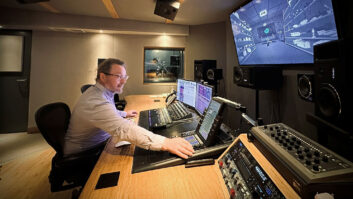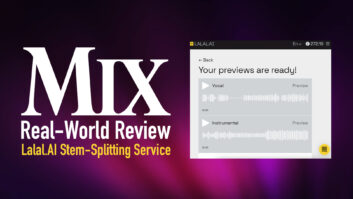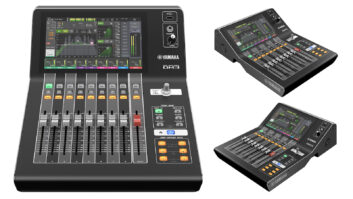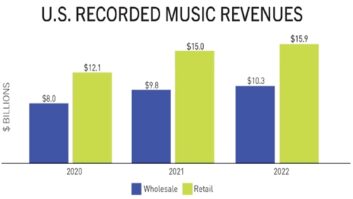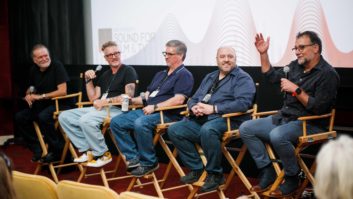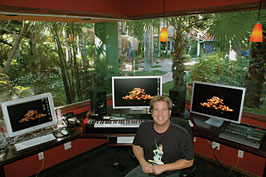
Randy Thornton, the COO of Non Stop Music (now a division of Warner Chappell), jokes that, “No one grows up saying, ‘I want to write for production music libraries!’” And he’s probably right, not only because the aspiration doesn’t seem as grand as writing for film, but also because it’s a line of work that young musicians might not be aware of. However, the demand for production music is huge; it’s used everywhere from radio promos to network television themes, and that’s great news for anyone making a living in the music business. As November is Mix‘s audio education issue, we thought it would be useful to let the next generation of D.I.Y. engineer/producer/musicians know more about the composers who specialize in cues that can tell a story in anywhere from 120 seconds down to 60 or 30 or 10.
Sonic Addiction composer Scooter Pietsch at work in Southern California
Thornton began his career as a studio session trombone player in Salt Lake City, where the Osmonds were a driving force. But Donny Osmond grew up, and a lot of studio players also had to move on when much of the local business dried up. A lot of musicians packed up and moved to major-market cities, but Thornton really wanted to stay in Salt Lake City, so he formed Non Stop Productions with fellow trombone player Bryan Hofheins.
“We specialized in jingles and on-air promos, getting whatever little scoring jobs we could get,” Thornton says. “Quickly, we had some really lucky breaks and we were doing national network promos for ABC-TV. Within two or three years, we were doing on-air promos for all the major networks, and that eventually led to the film-trailer industry. Some of the people we were working with at the network level started working in film and took us with them. So we were doing lots of film trailers, and at the same time we did the music for Good Morning America for nine years. And we’ve been doing The Today Show for 12 years.”
Thornton explains that while the company had reached an extremely successful point, the pace was grueling. “We were working seven days a week and just killing ourselves,” he says, “and the music library business was looking more and more desirable because you can produce music, put that music on CDs, sell those CDs all over the world, and people would even use it while you’re asleep and send you a check. So 14 years ago, we launched the Non Stop Music Library. We started producing CDs in various genres, and we would license it to TV networks, to ad people and the film-trailer industry.”
When Thornton and Hofheins began Non Stop, they were renting studio time and traveling, or shipping tapes to various far-flung places. Now, the company has offices in L.A., New York and London, and its headquarters in Salt Lake City includes one of the largest soundstages outside of L.A., with room for up to 40 musicians. Thornton divides his time between running a successful business, producing live orchestral sessions and composing some of Non Stop’s music in his own MOTU Digital Performer-based studio.
“I have a fairly elaborate home setup that I mock everything up on, but I’m still very attached to working with live musicians,” he says. “I like the interaction of working with live players. When I compose, I hear colors and instrumentation that comes from my performance background more than anything else.”
Jeff Wade creates most of the cues for FirstCom’s Velocity music library with production partner Ruben Ayala. Wade started out as a DJ and hip hop producer, while Ayala was an established musician/engineer in the Dallas/Fort Worth, Texas, area when the two began collaborating. “Ruben was a very respected engineer, and it didn’t take me too long to figure out that one of the reasons my music sounded so good was that Ruben is such a great engineer,” Wade says. “So as I moved more into production, we formed a partnership, and it’s a unique mix because my background is more urban and he was a really studied musician and a brilliant engineer.”

Randy Thornton, COO of Nonstop Music, began his career playing sessions for the original Donny and Marie Show.
Wade and Ayala have cultivated a niche with FirstCom, producing 10 titles a year for the Velocity library. “This is the first year we’re doing this, and it’s taking up close to 80 percent of our music time,” Wade says. “We’re pretty efficient at doing what we do, but now we do a lot more strategizing in the pre-production stage, covering where we want to go so that when we get down to actually creating the music, we’re flowing and going.
“FirstCom sets multiple release deadlines throughout the year,” Wade continues. “They have six dates, one every two months. So periodically, I get with [FirstCom senior VP] Ken Nelson and suggest concept ideas for a disc. He says yay or nay, and we try to plan a release schedule around having a certain variety.” In other words, if FirstCom has two guitar-based collections in the works, then the company wouldn’t release both of those on the same date.
For a while, Wade and Ayala had matching rooms based around Digital Performer, both with Genelec 1031 monitoring and a variety of plug-ins and analog outboard. Now, Ayala is in the process of moving his rig to a new studio in San Antonio, so most of the work is being done in Wade’s room, which was recently fitted with new Mackie HR824 monitors. “I think they’ve got a good broad range, and I get good low end, which we care about a lot because we do so much beat-oriented stuff.”

Whereas most music library music is delivered in the form of downloads, the companies still conceptualize their releases on a CD model. Velocity “CDs” have about 14 cues each. “And for each cut, there’s a full two-minute version; an underscore version; a 60, 30 and 10 [-second version]. We have to have the 60s, 30s and 10s because they’re so useful to people.”
Thornton of Non Stop Music says that his company no longer offers those short cues. He reasons that all of his company’s clients have their own desktop editing capabilities and can slice and dice their selections at will. Conversely, composer Scooter Pietsch goes above and beyond to create any possibly useful version of his music for his Sonic Addiction library, which he licenses through Premier Tracks.

“I think editors and producers want more,” Pietsch says, “so I give full-length two- to two-and-a-half-minute versions, and 60s, 30s, 15s, and I do alternative stuff: change up drum grooves and give different mixes without certain instruments. Anything to help the cues get used more.”
That said, Pietsch acknowledges that making money from music library work is “kind of a numbers game. The more tracks you write, the more money you’re going to make, because it’s impossible to know which track is the one that producers and editors across the world are going to latch onto.

“The thing that’s strange about music libraries is, you would think it’s only the contemporary tracks that sell, but I’ve found if you write supercontemporary stuff, you get a lot of uses early on, and then it tapers off because it sounds really dated. But a feel-good, happy acoustic guitar track will get used over the years, or a really nice sentimental piano-and-strings track will get used a lot.
“Also, the quirkiest tracks in the world can end up making a ton of money,” Pietsch continues. “It’s completely unpredictable. You know the Curb Your Enthusiasm theme? That’s a Killer Tracks cut. Larry David heard it on a commercial and thought it would be great for his show. I’m sure the composer never thought he would get that!”
Pietsch, who has a master’s degree in music composition, taught music at the college level for a couple of years before slowly building his successful composing career in L.A. Over the years, he has composed music for several music libraries until he decided to start his own with Premier. He spends most of his time scoring for TV and film projects, but he enjoys the challenge and the rewards generated by music library work. “The problem with working on TV shows is you pour your heart and soul into it, and the show gets canceled after a few episodes and everything you’ve done for it gets dumped into a black hole. It never gets used again. It’s work for hire, and the network or production company owns the music. The great thing about music libraries is they continue years later to sell that music and it gets used.”

And sometimes, Pietsch says, compositions get used in surprising situations: “I was working on a TV show, and this one particular editor wasn’t liking what I was writing, so they called me into the edit bays to talk about it,” Pietsch relates. “And the editor says, ‘We’re not liking what you have, but there is a track I would like to play for you. We absolutely love this cut, and we want you to sound like this.’ And I say, ‘No problem, I wrote that track.’ He says, ‘You did not. That’s from the Killer Tracks library.’ And I say, ‘I know. I write cuts for them. Look at the CD!’”
Pietsch writes in his own Apple Logic/Apogee Symphony-based studio, which is situated in a separate building on the same property as his house. Sitting in his personal studio, surrounded by guitars and windows onto his backyard, he says that the biggest challenge for him — or any composer — is not about being creative on demand, it’s about staying in business, keeping the money flowing in. Music library work offers an opportunity to create an increasing number of revenue streams.
“There’s so much need for these pieces of music. Cable TV is so music library-oriented,” Pietsch explains. “I think that for all composers now, especially those starting out, music libraries should be a reality. But keep in mind that there are definite specifics they want to see in a library track. For example, nobody ever fades out of a library cue. They always have an ending. And remember that people are cutting picture to it. Things that are rhythmic are always a good idea.”
FirstCom’s Wade recommends that any composer hoping to get music library work should browse library Websites to get a feel for the way the cues are composed. “You have to think in terms of having lots of motion, as opposed to being structured like a song. Once you grasp that, it expands your writing abilities quite a bit.”
Barbara Schultz is an assistant editor of Mix.

